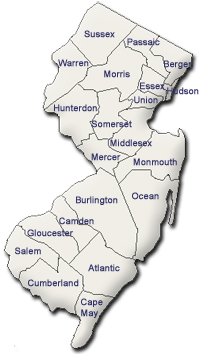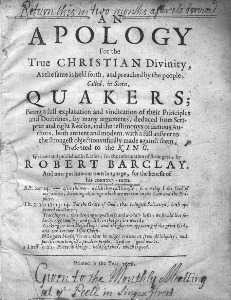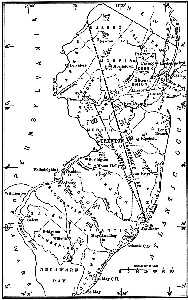Related Topics
Philadelphia Legal Scene
The American legal profession grew up in this town, creating institutions and traditions that set the style for everyone else. Boston, New York and Washington have lots of influential lawyers, but Philadelphia shapes the legal profession.
Quakers: William Penn
Although Ben Franklin gets more ink lately, William Penn deserves at least equal rank among the most remarkable men who ever lived.
Connecticut Invades Pennsylvania!
Connecticut once waged three serious wars with Pennsylvania, and we don't even remember it. But politicians noticed that all became peaceful after we united into a single nation. Others noticed the Articles of Confederation were strong enough to cope with invasions by neighbor states. The two proprietorships of New Jersey taught some smaller lessons. Virginia taught still other lessons.
Quakers: All Alike, All Different
Quaker doctrines emerge from the stories they tell about each other.
The Proprietorship of West Jersey
The southern half of New Jersey was William Penn's first venture in real estate. It undoubtedly gave him bigger ideas.
Nature Preservation
Nature preservation and nature destruction are different parts of an eternal process.
New Jersey (State of)
 The Garden State really has two different states of mind. The motto is Liberty and Prosperity.
The Garden State really has two different states of mind. The motto is Liberty and Prosperity.
Pre-Revolutionary Philadelphia
.
A Minor Politician
In 2013 I ran for the New Jersey Assembly, unsuccessfully. Daughter Miriam was my campaign Manager. I learned a lot from the experience. For example, I had 700,000 constituents. Maybe I shook hands with a couple hundred.
The Pennamite Wars
The Connecticut farmers believed the King's last word overturned all earlier ones, else why be a king? William Penn's revolutionary idea was that of private property -- the first sale created a new owner, whose new word erased any earlier ones. When you acquire a new continent from aborigines, that's a congenial viewpoint.
East Jersey's Decline and Fall
The colony of New Caesaria (Jersey) had two provinces, East and West Jersey, because the Stuart kings of England had given the colony to two of their friends, Sir George Carteret and John, Lord Berkeley, to split between them. Both provinces soon fell under the control of William Penn but it took a little longer to acquire the Berkeley part, so the Proprietorship of East Jersey was the oldest corporation in America until it dissolved in 1998.
 |
| Apology for the True Christian Divinity |
It would appear that Penn intended West Jersey to be a refuge for English Quakers and East Jersey was to be the home of Scots Quakers. Twenty of the original twenty-four proprietors were Quakers, at least half of them Scottish. Early governorship of East Jersey was assumed by Robert Barclay, Laird of Urie, who was certainly Scottish enough for the purpose, and also a famous Quaker theologian. Even today, his Apology for the True Christian Divinity is regarded as the best statement of the original Quaker principles. However, Barclay remained in England, and his deputies proved to be somewhat more Scottish than Quaker. Eighteenth-century Scots were notoriously combative and soon engaged in serious disputes with the local Puritans who had earlier migrated into East Jersey from Connecticut with the encouragement of Carteret. This enclave of aggressive Puritans probably provided the path of migration for the Connecticut settlers who invaded Pennsylvania in the Pennamite Wars, so the hostility between Puritans and Quakers was soon established. The Dutch settlers in the region were also combative, so the eastern province of Penn's peaceful experiment in religious tolerance started off early with considerable unrest. Of these groups, the Scots became dominant, even referring to the region as New Scotland. To look ahead to the time of the Revolution, most of the East Jersey leadership was in the hands of Proprietors of Scottish derivation, with at least the advantage that these were likely to have been very vigilant in seeing Proprietor rights originally conferred by the British King, continue to be honored by the new American republic.
East Jersey was probably already the most diverse place in the colonies when loyalists and revolutionaries took opposite sides in the bitter eight-year war over English rule, with hatred further inflamed when the victors in the Revolution divvied up the properties of loyalists who had fled. The earlier conflict was created by management blunders of the Proprietary leadership itself. Instead of surveying and mapping, before they sold off defined property, like every other real estate development corporation, the East Jersey Proprietors adopted the bizarre practice of selling plots of land first and then telling the purchaser to select its location. In the early years, it is true that good farmland was abundant, but inevitably two or more purchasers would occasionally choose overlapping plots of land. The Proprietors were astonishingly indifferent to the resulting uproar, telling the purchasers that this was their problem. The outcome of all this friction was that settlers petitioned London for relief, and in 1703 Queen Anne took governing powers away from both the East and West proprietorships and unified the two provinces into a single crown colony. The Queen obviously nursed the hope that South Jersey would impose a civilizing influence on the North, but immigration patterns determined a somewhat opposite outcome. Both proprietorships, however, were allowed to continue full ownership rights to any remaining undeeded property.
In later years, the East Jersey Proprietors created more unnecessary problems by attempting to confiscate and re-sell pieces of land whose surveys were faulty, sometimes of a property occupied with houses for as much as fifty years. This East Jersey proprietorship, in short, did not enjoy either a low profile or the same level of benevolent acceptance prevailing in the West Jersey province. A climate of skepticism developed that easily turned any management misjudgment into a confrontation.

|
| New Jersey Line |
The East Jersey proprietorship operated by taking title to unclaimed land, and then reselling it. In what seemed like a minor difference, the West Jersey group never took title itself, but merely charged a fee for surveying and managing the sale of unclaimed land. The upshot of this distinction was that the East Jersey group got into many lawsuits over disputed ownership, which the West Jersey Proprietorship largely escaped. The nature of unclaimed land in New Jersey is for ocean currents to throw up new islands in the bays between the barrier islands and the mainland, or pile up new swampland along the banks of the Hudson and Delaware Rivers. Such marshy and mosquito-infested land may have little value to a farmer but lately has become highly prized by environmentalists, who supply class-action lawyers with that nebulous legal concept of "standing". The posture of the West Jersey Proprietors is to be happy to survey and convey clear title to a particular property for a fee, but a buyer must come to them with that request. The East Jersey method put its proprietors in repeated conflict over possession and title, with idealists enjoying free legal encouragement from contingent-fee lawyers. By 1998, the Proprietors of East Jersey had endured all they could stand. Selling their remaining rights to the State for a nominal sum, they turned over their historic documents to the state archives. The plaintiff lawyers could sue the state for the swamps if they chose to, but the East Jersey Proprietors had just had enough.
The only clear thing about all of this is that the Proprietors of West Jersey now stand unchallenged as the oldest stockholder corporation in America. It's not certain just what this title is worth, but at least it is awfully hard to improve on it.
Originally published: Tuesday, December 30, 2008; most-recently modified: Thursday, May 16, 2019
| Posted by: Dr. Jeffrey Owens | Sep 2, 2013 2:31 PM |